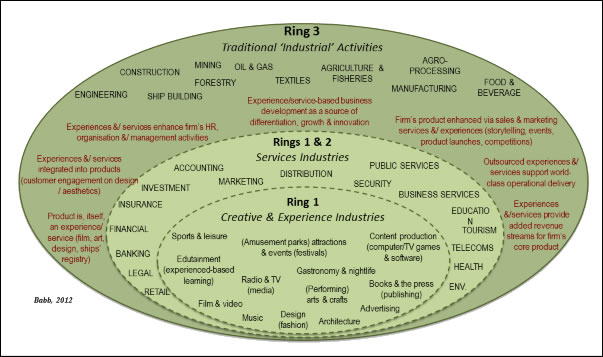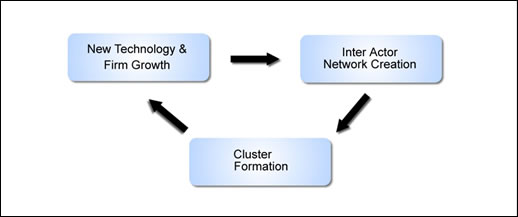IKED TOPICS
- - - - - - - - - - - - - - - - - - - - - - - - - - - - - - - - - - - - - - - - - - - - - - - - - - - - - - - - - - - - - - - - - - - - - - - - - - - - - - - - - - - - - - - - - - - - - - ::
..:: Experience Industries
Experience industry represents a concept for capturing a fundamental and often overseen driver for value-added in economic activities. While of relevance throughout the world, the concept promises new ways forward for developing economies. Together with a network of partners, IKED is in the process of exploring how to strengthen policies and strategies in support of experience based industry so as to generate new opportunities for such countries. In what follows, we give a brief introduction to this subject.
Kinds of experience based industry
Experience-based industry is marked by economic worth being created by firms by “experiences” playing a significant part of product value. This can occur to a varying extent, and through different mechanisms, as illustrated in the three-ring model below.

The inner ring represents the creative and experience industries, which might be described as being experiential in nature, intangible, and formed out of the creative imagination.
The middle ring is made up of the services industries, which are also intangible in nature, and which emerge from people and companies offering knowledge and time to improve the operations and efficiency of other players in the economy.
The outer ring represents traditional industrial economic activities involving the processing of raw materials and manufacture of tangible goods.
In more sophisticated economies, traditional industrial activities might leverage services and/or experiences from the two inner rings to supplement and add value to core products. As suggested by the red text, this movement in value-added is enabled by the digital technology revolution, which has the potential to unleash true innovative potential, particularly for small and medium-sized enterprises in small, resource-rich and resource-poor developing countries.
Dynamics for sector development
While manufacturing is good for any economy, whatever its size, and it helps to have access to useful primary commodities like oil, gas, coal, or gold, it is becoming more and more important to connect consumers with experience and services that appeal to their sensibilities and senses.
In this sense, we are seeing value shift from products to services to experiences (C. K. Prahalad and M. S. Krishnan in The New Age of Innovation), creating opportunities for businesses to add value to their products by involving users in compelling, engaging experiences.
At the same time, it is well known that the rise of dynamic innovative clusters requires a combination of new technology and firm development, inter-actor network creation and cluster-formation (see Figure 2, below, from IKED's Cluster Policies Whitebook) of a kind that strengthens continuous renewal of the specific assets and capabilities that are relevant to the particular cluster.
In the information- and creativity-based era now arising, needs and means extend beyond that. Multiple relevant stakeholders need to not only become engaged, but also to be enabled to free up new kinds of interlinked dynamism. Forums for seed and venture funding must link innovative kinds of mentorship and professional-service support, spanning the local, regional and global spheres.
Figure 2: Inner Dynamic of an Innovative Cluster
Source: Cluster Policies Whitebook, IKED, 2005.

In the case of the experience, creative and services industries, the capabilities that come into play benefit from linking competences in areas such as:
- City, Culture, and Sustainability;
- Contemporary Art and Luxury Brand Development;
- Art Curatorship and Management;
- Digital Multi-Media and Multi-Service Platforms;
- Digital Humanities;
- Culture-Based Learning for Corporations and Organisations.
New combinations of knowledge development and use, engaging a critical mass of competences, can arise partly from linking local, regional and international capabilities in innovative ways around action-oriented agendas devoted to innovation, renewal and value-creation.
Developing countries are marked by weaknesses in many of the conditions that are key to the rise and value-generation of experience industries. At the same time, for several reasons, such countries may meet with particular opportunities in this area. This is in part since they tend to retain a relatively large share of "original" culture. Cultural expression often forms a channel for creativity and human energy under conditions when material well-being represents a challenge. Further, the establishment of vested dominating stakeholders, which are relatively strong in developed countries, have a tendency to streamline and hamper a variety of cultural expressions. The way forward is for developing countries to leverage their particular unique strengths, and to counter their weaknesses in this area.
IKED has developed networks with partners and key players in the Caribbean and Latin America, Europe, the Middle East, and North America to leverage these capabilities for small and medium-sized enterprises and players poised to become part of innovative global value chains (GVCs) in critical areas of the economy.
- - - - - - - - - - - - - - - - - - - - - - - - - - - - - - - - - - - - - - - - - - - - - - - - - - - - - - - - - - - - - - - - - - - - - - - - - - - - - - - - - - - - - - - - - - - - - - :: << Back
